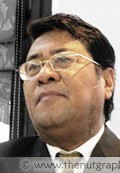Common cause Malaysia's three major races are reflected in one train carriage
By Michael Schuman (TIME)
Malaysia is that rare country with an unequivocal national narrative. It goes something like this: Malaysia's 28 million people, comprising mainly Malays, Chinese and Indians, make up a moderate and modern emerging democracy. Unlike members of other multiethnic countries, they respect one another's beliefs and values and share a commitment to achieving prosperity. The official religion is Islam, but other faiths are freely allowed and celebrated. This is one harmonious place.
Much of that narrative is true — but not all of it.
Malaysia's economic miracle has stalled, and while the nation is, indeed, somewhat pluralistic, it is no melting pot. Indeed, it is a society where people define themselves first and foremost by race. (See pictures of Islam in Asia.)
The country's political leadership has in some respects reinforced those ethnic identities. For the past 40 years, policymakers have doled out special privileges — in education and business — to one community: the majority Malays. The program is one of modern history's greatest experiments in social engineering and possibly the world's most extensive attempt at affirmative action. But the policies have also bred resentment among minorities, distorted the economy and undermined the concept of a single Malaysian identity.
Now a movement is gaining strength to finally change the system — and it's coming from the very top. Prime Minister Najib Razak, 57, has surprised the country by advocating a fundamental reform of the pro-Malay program first introduced, ironically, by his father, who was Malaysia's Prime Minister in the 1970s. Though the specifics of the new policies remain hazy, Najib's intent is not. "I want Malaysia to be globally competitive," he told TIME in an exclusive interview. "For that, we need to get every single Malaysian to be together."
Najib's proposals have simultaneously raised hopes, ire and fear. The mere idea of changing the affirmative-action system has reopened old wounds in Malaysian society and reactivated the long-running debate on how best to fuse Malays, Chinese and Indians into one nation. The direction Malaysia takes, moreover, has repercussions beyond its shores. The issues raised by Najib's proposals are relevant to any upwardly mobile developing economy, especially a multicultural one: how to increase wealth and do so equitably. (Read "Why the Honeymoon is Over for Malaysia's New PM.")
In confronting these sensitive challenges, Najib is taking enormous political risks. The primary base of electoral support for Najib's political party, the United Malays National Organization (UMNO), is the Malay community, and altering decades-old perquisites could cause voters to defect to the opposition. But Najib believes he has little choice. If Malaysia's economy is to compete with China, India and other rapidly emerging neighbors, Najib sees no other route but reform. "The competition is much greater and some would describe it even as cutthroat," Najib says. "There is a realization that what has worked in the past may not necessarily work in the future."
The Malay Card
Najib is facing the same dilemma his predecessors have since the earliest days of Malaysian independence: balancing the perceived needs of the Malays, both political and economic, with those of the country as a whole. At the heart of the problem is the reverse-pyramid shape of the Malaysian economy. Though the Malays and other indigenous peoples, together known as bumiputra in Malay, make up about 60% of the population, they have traditionally been poorer than the Chinese and Indian immigrants, who have long dominated the nation's business and trade. After Kuala Lumpur was struck by race riots in 1969, a shaken leadership determined that communal peace was impossible without economic balance. The result was the New Economic Policy (NEP), introduced in 1971, which aimed to raise the Malays' share of the economic pie. Malays were given preferential access to public contracts and university scholarships. Any company listing on the stock market had to sell 30% of its shares to bumiputra investors. Though some measures have been softened or eliminated over the past two decades, many pro-Malay privileges remain. Certain government contracts are available only to bumiputra-controlled firms, for example. Malays even receive special discounts on home purchases. The affirmative-action program has become so ingrained in the Malaysian psyche that it is akin to a national ideology.
It is also controversial. Critics contend that the pro-Malay program too often benefits the connected few over its intended targets: the poor and struggling. All car-import permits, for example, are awarded to bumiputra-controlled firms, a policy intended to foster entrepreneurs in the community. But government audits have revealed that Malay businessmen with access to the permits sometimes sell them to minority traders who don't — at an instant profit. (The Ministry of Trade and Industry, recognizing the problem, says it will phase out the permit system by 2020.) "Unfortunately, as [the NEP] was implemented over time, some of the zealots, politicians and bureaucrats included, tended to become more racial and emphasized more on the people who have relationships with them," says Razaleigh Hamzah, an UMNO dignitary and former Finance Minister. "That's where it went wrong."
Despite four decades of special aid, 3 in 4 of the poorest people in Malaysia are still bumiputra. Adli Ahmad Ghazi, the Malay co-owner of Malaysian Defensive Driving & Riding, a 70-employee driving school in Kuala Lumpur, complains that the pro-Malay policies do little to help a small businessman like himself. In 2008, Adli tried to get financing from three agencies tasked with supporting Malay businessmen or small enterprises, but got rejected. When he has to deal with the bureaucracy, Adli says, he faces the same red tape as any other businessman. It took him two years to buy a parcel of land for his company from the local government. "The [NEP] rules don't really apply to people on the ground," Adli says. "They say the NEP would help the Malays, but it only helps a small percentage of the Malays."
Comfort Zone
Affirmative action may not be helping the overall Malaysian economy either. Though Malaysia has been among the best-performing economies in the world since World War II and boasts a spectacular record of improving human welfare — the percentage of the population living in absolute poverty has plummeted from 50% in 1970 to less than 4% today — the story is now stuck on the same chapter. Malaysia has fallen into what is called the "middle-income trap." Having elevated itself to a comfortable level of income, Malaysia has been unable to take that next leap into the realm of advanced economies. While growth has slowed, Malaysians have watched other fast-paced Asian rivals zip by. In 1970, the gross national income per capita of South Korea, at $260, was below Malaysia's $380, but by 2009, South Korea's was almost three times larger, at $19,830 vs. $7,230, according to the World Bank. (See pictures of Malaysia.)
Malaysia's struggles reflect those facing Southeast Asia as a whole. The region's economies once seemed among the world's most promising emerging markets, but in recent years, progress in almost all of them has been stymied by upheaval and poor governance. Thailand remains rudderless as its fragile democracy has degenerated into perpetual factional strife. The promise of the Philippines remains unrealized as its feeble government has continually failed to enact the tough reforms needed to turn around the underperforming economy. Indonesia is only now returning to its place as one of the world's premier emerging economies after a decade of political uncertainty scared off foreign investors.
If it is able to change its economic system, Malaysia could show its neighbors the way forward. Malaysia's essential problem is that its growth model — export-oriented manufacturing, often by foreign-invested factories — has become mismatched with its needs. Malaysia must become more innovative if its rapid development is to continue. But that's not happening. Private investment has fallen from a third of GDP in the mid-1990s to only about 10% today, labor-productivity growth has slowed, and R&D spending remains anemic. Instead of developing new products with highly skilled technicians, Malaysia's manufacturing sector still too often assembles goods designed by others, using imported technology and low-skilled foreign workers. "There is a growing realization that Malaysia's relative position compared to other countries that are catching up very quickly is not improving," says Philip Schellekens, a senior economist at the World Bank. "Relative to where they want to be, there is still a long road." (Read "Fortress Asia: Is a Powerful New Trade Bloc Forming?")
Though it would be incorrect to blame the pro-Malay policies for the economy's woes — Malaysia did, once, achieve remarkable rates of growth with the perquisites in place — they are nevertheless dampening business sentiment, scaring off talent, curtailing investment and stifling domestic competition. Chua Tiam Wee, president of the SMI Association of Malaysia, a small-enterprise organization, believes relaxing the NEP preferences would create a more level playing field on which the most capable firms could advance, making the economy more merit-based and upgrading Malaysian industry. The affirmative-action policy is "a source of a lot of distortions to the economic system," Chua says. By limiting the opportunities available to minorities, the NEP is likely contributing to a brain drain, in which some of the country's most talented people choose to work elsewhere. The government estimates that more than half of the 350,000 Malaysians working abroad have a college education. Stéphane Garelli, director of the World Competitiveness Center at IMD, a business school in Switzerland, believes that the affirmative-action regulations have made Malaysia less attractive to foreign investors. Malaysia's "bargaining power to put such restrictions on foreign investors is not as big as other nations'," he says.
Chinese and Indian entrepreneurs in Malaysia certainly believe the pro-Malay policies cap their business opportunities. Pardip Kumar Kukreja, the Malaysian-Indian chairman of Grand Paradise Holdings, a Kuala Lumpur — based firm that manages and owns hotels and operates travel agencies, laments that he can't get access to lucrative contracts providing travel services to the government due to regulations that favor Malay-owned enterprises. Removing such restrictions, he says, can act as an incentive to invest. Kukreja recently decided to launch an Internet-based business to sell travel services worldwide because Najib's administration liberalized affirmative-action rules for the tourism sector last year. "There are many things we'd like to do, which we hope we'll be able to do in the near future," he says. "To a small and medium entrepreneur, he wants to make his own decisions."
New and Untested
Najib is convinced the old ways must go. The centerpiece of his economic reform program, introduced in March, is called the New Economic Model (NEM). The plan envisions reducing red tape to encourage more private investment and internal competition, decreasing the state role in the economy and improving the education system to produce more skilled workers. "For us to move up a few notches, we have to address the structural problems," Najib says. "We cannot be in denial." Most of all, the NEM also proposes a major reform of affirmative-action policies to phase out remaining racial quotas and focus efforts on uplifting the poorest 40% of the population — irrespective of race. Says Najib: "I don't want anyone to feel that they've been left out or marginalized."
There are urgent political reasons he feels that way. UMNO, which has ruled Malaysia in coalition since its independence from Britain in 1957, lost ground to opposition parties in a hotly contested 2008 general election, and Najib is faced with the daunting prospect of expanding UMNO's political base outside its core Malay constituency. The NEM is an effort by Najib to turn stodgy UMNO into the party of change and outmaneuver its rivals. Some powerful voices within UMNO are egging on Najib to push his reforms. "We have to be bold and brave to ensure [our] long-term competitiveness," says Khairy Jamaluddin, an UMNO member of Parliament. (Read "Will Sodomy Charges End Malaysia's Opposition?")
Yet Najib has also come under pressure from conservative elements in the Malay community to hold back. "The bumiputra are still lagging behind," complains Ibrahim Ali, president of Malay nationalist organization Perkasa. "If the economy is not balanced, then everything will lead to trouble." As a result, Najib doesn't have full support from an UMNO worried about scaring off Malay voters. Najib's reform program "is a tough sell within the party," admits Khairy. "There will be people who resist the changes."
The split in UMNO reflects the greater divide within the Malay community over the future of affirmative action. Some Malays believe that they still don't possess the skills and resources to contend against Chinese businessmen, making continued affirmative-action policies indispensable. The program "should stay in place and improve," says Rizal Faris, president of the Penang Malay Chamber of Commerce. "What [officials] want to achieve is a level playing field where all parties are able to compete on their merits, but we need to ensure that the Malay community has been sufficiently skilled and pulled up." But others believe the time has come for Malays to step up and compete on their own, without special government aid. Akmal Syahirah, a 21-year-old law student at the University of Malaya, says that affirmative action should be eliminated, even though her family has greatly benefited from it in the past. Her father acquired land to produce palm oil through a pro-Malay development scheme, and her three younger sisters received tuition for extra after-school studies. But now, "I think we need to change," she says. "We can't just let Malays stay in their comfort zone."
Balancing Act
Faced with such contending forces, Najib is trying to please everybody. Affirmative action won't be eliminated entirely under the NEM, but altered to weed out abusive practices, target money where it is most needed and support the most worthy Malay businessmen, all the while trying to open up opportunities for minorities. Najib sees no contradiction in such a strategy. "Affirmative action remains in place, but the way it is carried out would be different," he says. "When it comes to helping the poor and the vulnerable groups, it should be irrespective of race. But there are certain affirmative actions which are still necessary, because the bumiputra are still very much behind and they must be helped. We want to help those bumiputra who are potential winners."
Even as he faces the daunting task of reforming Malaysia, Najib must deal with the domestic and international fallout from the divisive trial of Anwar Ibrahim, the opposition's most prominent leader. In 2008, only months after the opposition's electoral success, Anwar was charged with sodomy, a serious crime in Malaysia. The trial has a déjà vu flavor. Anwar was convicted of sodomy in 2000 (and abuse of power a year earlier), but the ruling was overturned in 2004 and he was freed after six years in prison. Anwar has pleaded not guilty to the latest charge and attacked his trial as a politically motivated attempt to discredit the opposition. The government denies that, saying the courts have a duty to conduct a fair trial. Yet the case has tainted Najib's administration. In a joint essay in the Wall Street Journal, former U.S. Vice President Al Gore and former Deputy Secretary of Defense Paul Wolfowitz wrote that Anwar's trial threatens "all those in Malaysia who have struggled for a freer and more democratic nation."
The biggest test for Najib still awaits. All eyes are watching for the detailed policy prescriptions of Najib's NEM, which could be released in October. Some Malaysia experts expect the final package to be underwhelming. Najib "doesn't have the strength to follow through, whether politically or personally," says John Malott, a former U.S. ambassador to Malaysia. "He's not a transformational figure." Najib insists his critics underestimate him. "I want to transform Malaysia," Najib says. "I want Malaysia to be a 21st century nation and I am determined to do that." Malaysia's future — and new narrative — depends on it.
— with reporting by Liz Gooch And M. Krishnamoorthy / Kuala Lumpur
 By G Vinod - Free Malaysia Today
By G Vinod - Free Malaysia Today




 On the Food Trail with Tiberius Kerk
On the Food Trail with Tiberius Kerk Penang chee cheong fun is best with some local sweet sauce, chilli sauce, oil and a handful of fried onion rings. The locals swear that it surpasses those fusion chee cheong fun outside the state.
Penang chee cheong fun is best with some local sweet sauce, chilli sauce, oil and a handful of fried onion rings. The locals swear that it surpasses those fusion chee cheong fun outside the state. Perhaps that is why so many ex-Penangites rush back to their beloved island the first chance they get. Where else but Penang, you can get a bowl of steaming hot hokkien prawn mee for RM2.50.
Perhaps that is why so many ex-Penangites rush back to their beloved island the first chance they get. Where else but Penang, you can get a bowl of steaming hot hokkien prawn mee for RM2.50. I will happily vouch for the above par hawker food sold in either coffeeshop. It is not coincidental that the residential homes in Pulau Tikus are highly priced.
I will happily vouch for the above par hawker food sold in either coffeeshop. It is not coincidental that the residential homes in Pulau Tikus are highly priced.










